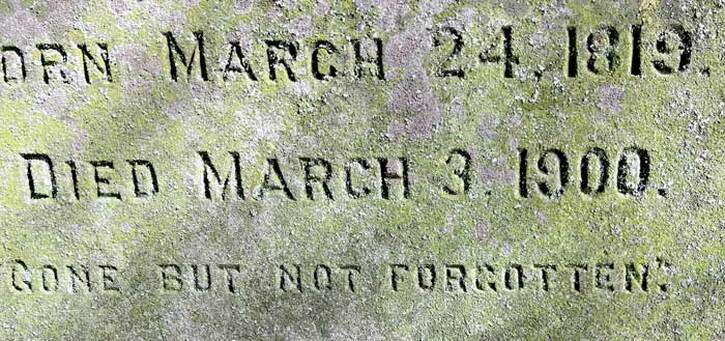
Today I visited one of my favourite silent places (see this post) and as usual found it empty, and so welcome and welcoming. Although it was around 1pm, I said the Evening Office, made easy by some app on my iPhone. The wonder of it all. Before entering I walked around the churchyard, reading such headstones as remained legible. I came across this one, and the text that clamoured for attention read "Gone but not forgotten".
This is almost certainly no longer true. The person had been born in 1819 and had died in 1900. Remembered for a while, no doubt. But those doing the remembering - who knew the deceased - are themselves long dead. I read the inscription as a statement of hope and comfort, and of unexpressed fear. We shall all be 'forgotten'.
I have long suspected that at the root of much human difficulty, evasion, maladaptation and anxiety is fear of our death and oblivion, our being forgotten. This is hardly ever faced (truly, hardly ever faced), and so we remain unaware of the cause but routinely suffer the consequences.
Ernest Becker's The Denial of Death (1973) deals with this matter directly. It is a sobering but strangely liberating read. See the wiki summary here. Socrates advised that we practice dying (that is, face it, meditate upon it, live with its inevitability) in order to become morally serious (authentic) persons.
"Human beings are mortal, and we know it. Our sense of vulnerability and mortality gives rise to a basic anxiety, even a terror, about our situation. So we devise all sorts of strategies to escape awareness of our mortality and vulnerability, as well as our anxious awareness of it. This psychological denial of death, Becker claims, is one of the most basic drives in individual behaviour, and is reflected throughout human culture. Indeed, one of the main functions of culture, according to Becker, is to help us successfully avoid awareness of our mortality. That suppression of awareness plays a crucial role in keeping people functioning – if we were constantly aware of our fragility, of the nothingness we are a split second away from at all times, we’d go nuts. And how does culture perform this crucial function? By making us feel certain that we, or realities we are part of, are permanent, invulnerable, eternal. And in Becker’s view, some of the personal and social consequences of this are disastrous." (Source: The Ernest Becker Foundation).
Acquainting ourselves with the certainty of our death and our eventually being forgotten only enhances life. Its something we should practice.
This is almost certainly no longer true. The person had been born in 1819 and had died in 1900. Remembered for a while, no doubt. But those doing the remembering - who knew the deceased - are themselves long dead. I read the inscription as a statement of hope and comfort, and of unexpressed fear. We shall all be 'forgotten'.
I have long suspected that at the root of much human difficulty, evasion, maladaptation and anxiety is fear of our death and oblivion, our being forgotten. This is hardly ever faced (truly, hardly ever faced), and so we remain unaware of the cause but routinely suffer the consequences.
Ernest Becker's The Denial of Death (1973) deals with this matter directly. It is a sobering but strangely liberating read. See the wiki summary here. Socrates advised that we practice dying (that is, face it, meditate upon it, live with its inevitability) in order to become morally serious (authentic) persons.
"Human beings are mortal, and we know it. Our sense of vulnerability and mortality gives rise to a basic anxiety, even a terror, about our situation. So we devise all sorts of strategies to escape awareness of our mortality and vulnerability, as well as our anxious awareness of it. This psychological denial of death, Becker claims, is one of the most basic drives in individual behaviour, and is reflected throughout human culture. Indeed, one of the main functions of culture, according to Becker, is to help us successfully avoid awareness of our mortality. That suppression of awareness plays a crucial role in keeping people functioning – if we were constantly aware of our fragility, of the nothingness we are a split second away from at all times, we’d go nuts. And how does culture perform this crucial function? By making us feel certain that we, or realities we are part of, are permanent, invulnerable, eternal. And in Becker’s view, some of the personal and social consequences of this are disastrous." (Source: The Ernest Becker Foundation).
Acquainting ourselves with the certainty of our death and our eventually being forgotten only enhances life. Its something we should practice.